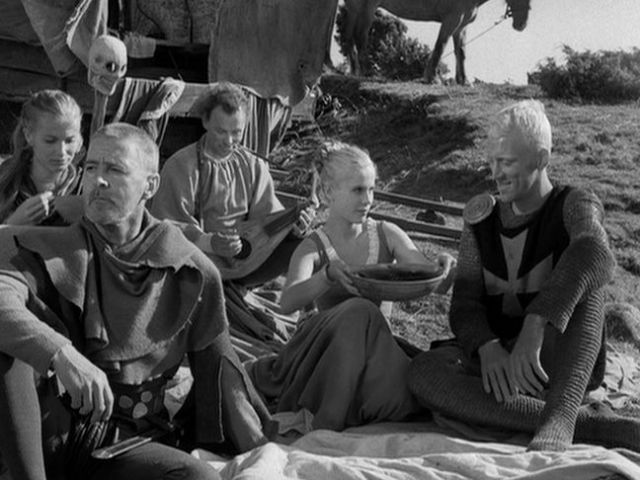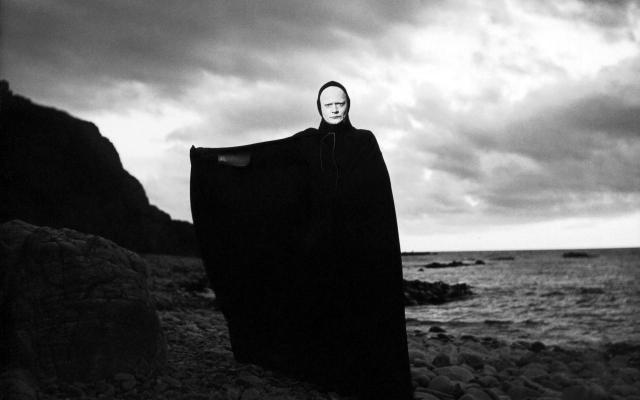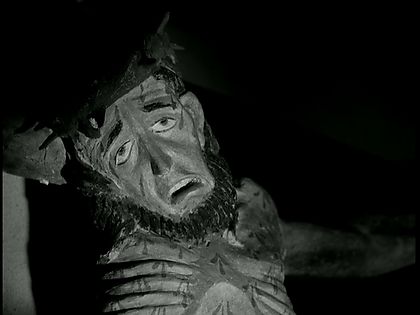
Death is always behind them.
Perhaps no other film is more emblematic of the “Foreign Art Film” than Ingmar Bergman’s 1957 opus, The Seventh Seal. Endlessly referenced, parodied, and canonized, it seems that everyone who loves film has to see this. So as far as Blind Spots goes, this is a big one.
The film itself had become in my mind, before I had yet seen it, already burdened with the imposing weight of Greatness. And the stark image of Death with his arm stretched out and the black cloak billowing was already so familiar, that I expected an overburdened seriousness to pervade the film.

THIS IS A SERIOUS FILM. SERIOUSLY.
In fact, the film is not very long, and the episodic narrative and diverse set of characters keeps the pace of the film brisk and engaging. In a way, it’s unfortunate that such a dominant image as that of the knight playing chess with Death on the shore should have become the primary (only?) icon of the film in the popular consciousness. The Seventh Seal is filled with scene after scene of incredible black-and-white images, any of which could have helped fix this film in the pantheon of world cinematic masterpieces. The tone is Shakespearean, with a heightened, theatrical style of acting. Like a Shakespeare play, there are some broad and some more subdued characters, and though the emotional content is often explicitly declaimed through the dialogue, yet there is psychological and symbolic complexity underneath.
Bergman’s thematic exploration of death is made profoundly rich through the actions of the various characters. Death is personified in the man that plays chess against the knight, but death is actually on everyone’s mind. The plague is rampant, and the fear of death which this brings leads to panic, violence, and persecution. One woman is blamed for bringing the plague to the town by being in league with the devil, and is in captivity awaiting her execution by burning. When the knight questions her, she seems to believe it herself, but he, tellingly, only sees fear in her eyes.
Fear is on people’s minds today as well: fear of terrorism, fear of economic collapses, fear of war, fear of the Other. Bergman’s film show us, abstracted from our present concerns by the medieval setting, the wages of fear. Fear leads to violence, as in the case of the smith who seeks to murder his unfaithful wife and her lover, or in the case of the former seminarian who has turned to robbing the dead. This robber, in one scene, stirs up a drunken crowd in a tavern to persecute an innocent wandering actor for a crime he didn’t commit. The pointlessness of his cruelty mirrors the indiscriminate advance of the black plague, which forms the foundation of the fear running through the hearts of the villagers.
The knight at the center of the story does not fear death as much as he fears blackness, the notion that there is nothing after death. He grapples with the absence of God. He and his squire have returned from a Crusade, where it is clear that they expected to be doing the work of God, but only experienced the ravages of a very human war. Though he has been disillusioned, he continues to wrestle with his faith. In contrast, his squire has adopted a more worldly approach, and displays a complex mixture of loyalty, defense of the weak, and self-serving smugness, as he tries to cope with the evils he has experienced.
The film is bleak, yet avoids utter despair or cynicism, even when there seems little reason for hope. Most of the characters believe that God’s judgment is upon them, and seek refuge in harsh self-abasement. The “Dies Irae,” (“Days of Wrath”) is chanted by the penitents who march through the village scourging themselves and carrying crosses. This chant, which comes from the old form of the Requiem mass, is also echoed in small motifs in the score. The text describes the day of wrath which will occur at the end of time. The “Seventh Seal” itself is a reference to the outpouring of God’s apocalyptic judgment, in a passage from the book of Revelation that is twice quoted in the film.
It’s interesting that the theme of Judgment Day is so present alongside the theme of the absence of God. If God is judging the world through the plague, then he is not absent, but rather disturbingly close at hand. Yet the knight cannot perceive the presence of God, no matter how fervent his prayers. This juxtaposition of viewpoints is part of what makes the film so rich. The other viewpoint to consider, which is a third way from the squire’s pragmatic world-weariness and the knight’s angst-ridden wrestling, is that of the visionary artist, represented by the itinerant actor.
The actor Jof lives an idyllic life on the road with his beautiful wife and son, and though his artistry is perhaps questionable, his innocence of spirit is certain. The bits of juggling, singing, and pantomime that we see are not perhaps indications of an artist of the first rank. However, in the scene which introduces him, Jof awakes to a vision of the Virgin Mary and the Christ child, showing us that he is a visionary. He has his eyes fixed on the eternal, while the peasants he seeks to entertain are concerned with the mundane. He is later the only other character who sees Death in the chess match with the knight, which causes him to take his family away from the others. He has one final vision at the conclusion of the film, an ambiguous image of a dance with Death. This could mean many things, especially since Bergman never allows us to suspect that his sympathies are completely aligned with any one viewpoint of a particular character.

Though the word “iconic” is perhaps overused, there really can be no more appropriate description for this film. The characters are Icons of a spiritual search in the face of fear, death, and a sense of meaninglessness. Taking on the theme of Death is an ambitious project for any artist, and to meaningfully explore it at once from so many angles in a single work is an achievement of lasting importance.
This post is part of the Blind Spot Series, hosted by The Matinee blog.


Great review, and now I really want to rewatch this. Like you, I was surprised by how little screen-time Death (the character) actually had, considering how iconic that image is. Also, I’m glad that you pointed out the juxtaposition of viewpoints, because I think that’s one of the things that makes this film, and a lot of Bergman’s work, so interesting; the viewer can draw his or her own conclusions, and those might even change from one viewing to the next.
LikeLiked by 1 person
Thanks as always for reading. My main surprise in watching it was that the film was so enjoyable and brisk.
I’m sure I’ll revisit it again with new eyes in the future and see more than I did on just this first viewing.
LikeLike
I’m surprised this was a “Blind Spot” film for you! I mean, I myself haven’t seen it, but I’m surprised YOU hadn’t.
I was also surprised to learn that the film was enjoyable and well-paced. I did not expect that. Guess it’s time to see it, after reading your review! 🙂
LikeLike
There’s a lot of Movies I haven’t seen! This is only the second Bergman film, after PERSONA, that I have watched. Thanks for reading as always!
LikeLike